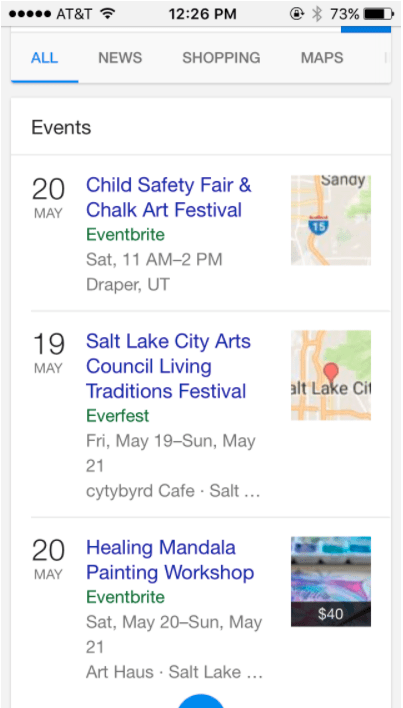More than 9 in 10 online experiences begin with a search. Is your event showing up in the results?
The art that goes into showing up in search results is called SEO, or search engine optimization. But what is SEO exactly? Google — the world’s most popular search engine — ranks your website by “relevance” and “authority” in its search results. And the higher your rank, the higher your website appears on its results page and the more likely people are to see and click.
But wait — what do we mean by “relevance” and “authority”? Here’s a quick definition for both:
- Use relevant key terms without going overboard. Google judges your relevance to a search based on keyword matches. But it also demotes websites that abuse keywords, so don’t use too many on your listing page.
- Gain the trust of others to establish your authority. The more “trusted” websites linking to your own site, the higher your SEO ranking and search performance. For example, Eventbrite is the most linked-to event discovery site on the planet, giving our pages more “authority” than digital veterans, like eBay.
Now that we know what Google looks for (relevance and authority), here’s how to optimize for both.
Plant popular keywords where they matter most
Your event name is the most valuable keyword of them all. It’s what Google scans first in evaluating your site’s relevance to a search.
First off, make sure your event name matches your domain. When attendees search specifically for your event, your listing should be the first to appear in Google’s results.
But most of the time, event-goers aren’t searching for your exact name but for relevant terms — like “things to do in NYC this weekend.” Include popular keywords in your event title to help Google match your listing with these searches.
That said, keep it short: Google downplays sites with cut off titles in their results. Don’t forget that Google also scans your event description, URL, and image caption, so keywords are important to include in those spots as well.
Share your event’s most important details
Event-goers want to know the “when” and “where” of your event, and so does Google. The search engine knows events are timely, so in hopes of offering people the most relevant search results, it will use your event’s date and location to rank your listing. Forget to include this information on your listing and you might not make the cut.
If you use Eventbrite, your event will likely appear in a skimmable list at the top of Google’s mobile search results. Google partnered with Eventbrite and a handful of other ticketing providers for their initial launch of Google Events last year. This update makes it much easier for browsers to discover events they weren’t aware of before — and makes your event much easier to find by those who are looking for something to do but aren’t sure exactly what yet.

Give websites a reason to link
Other websites linking to your listing boosts your credibility and SEO ranking. So it’s important to encourage people to share your listing online.
Start by asking your speakers, vendors, and sponsors to promote your listing on their websites. Even a share on social media counts toward your SEO, so keep up those engaging posts! But beware: paying other sites to link can get you banned from Google, so be honest and authentic when using this strategy.
Publishing quality content more frequently also helps boost your SEO because good content gets shared, and shares matter to Google. One easy way to produce more? Repurpose old content, especially if you’ve hosted this event before.
For example, cut old videos into smaller clips to re-publish on social and drive to your listing. Keep posting articles, photo galleries, and videos, even once your event’s over. And by your next event, you’ll start to see some serious results.
Buy keywords to capture immediate interest
At the end of the day, you’re never guaranteed a top spot in Google’s search results. With more websites going up every day, the competition is stiff. Developing a strong search presence takes a lot of work and happens over time.
If you’re eager to see more immediate results, consider investing money in paid search. Google AdWords enables you to buy keywords and features your listing at the top of relevant search results. And with AdWords, you only pay for clicks. You can also target people who match your attendee profile, helping you convert more searches into sales.
Like social media, paid search performs best with experimentation, so adjust your keywords along the way, depending on which ones are driving the most results.
For more on how to boost your event’s SEO, check out this SEO Cheat Sheet for Events.






